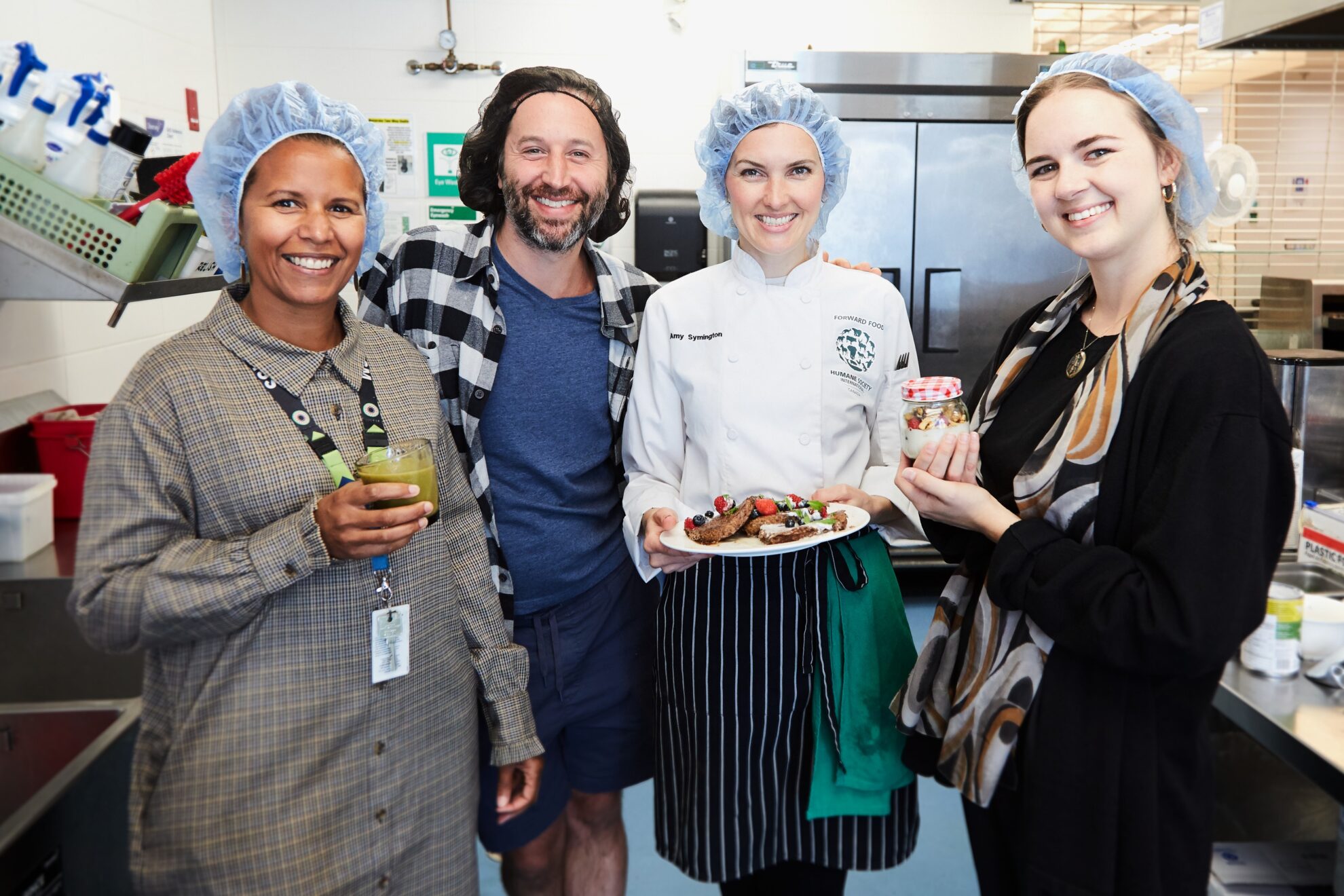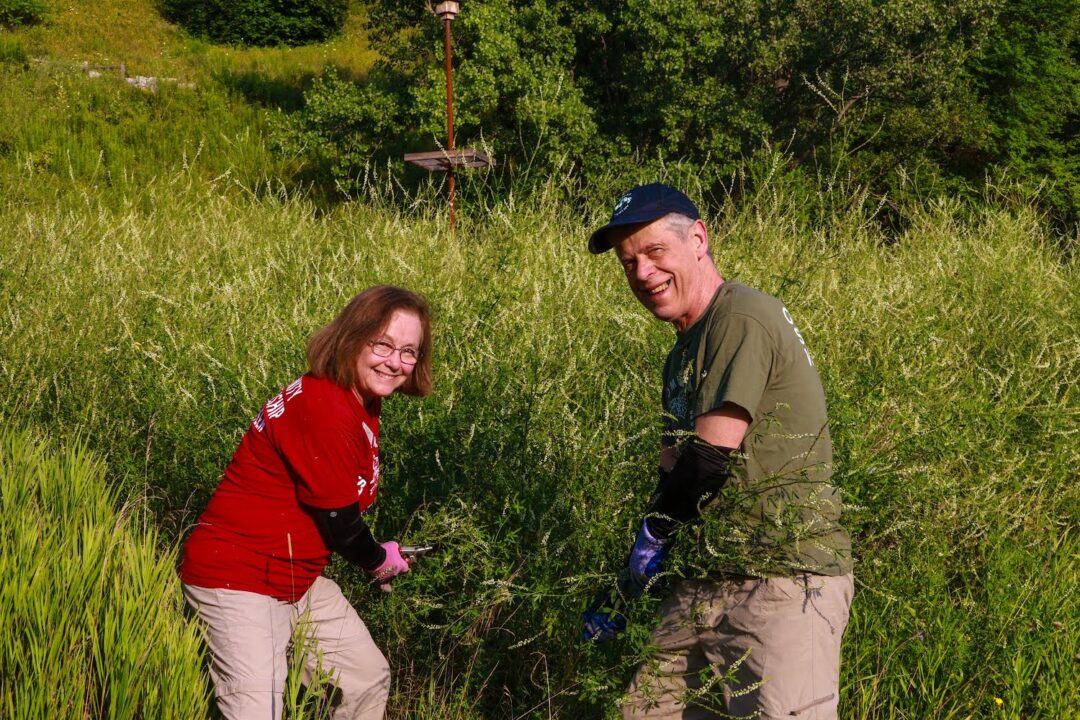Winnie Czulinski –
For the Toronto Vegetarian Food Bank’s tenth anniversary this year, it’s human business as usual, helping those in need. This Saturday food bank at 270 Gerrard Street East (a site of the Yonge Street Mission) has served more than 350,000 meals of fresh plant-based groceries to community members.
Patrons also get a hot meal, live music, community supports, nutritional consultation – and no dumpster of people’s leftovers. Instead, the food is 70 percent fresh produce, and the remainder is nutritious packaged items like tofu, tempeh, dry pulses, soy milk, whole-grain pasta, brown rice, and Cobs bread.
The Toronto Vegetarian Food Bank supports people who eschew eating animal products. “By the time someone’s using a food bank, they are obviously really needing help,” says founder/ executive director Matt Noble. “We feel that when people are struggling, they shouldn’t have to sacrifice their deepest-held beliefs.”
After the Toronto Vegetarian Food Bank opened at the Yonge Street Mission, Noble and his colleagues partnered with the T. Colin Campbell Centre for Nutrition Studies to bring nutritional literacy to food-insecure clients at the YSM. Patrons got cooking lessons, along with groceries to make the meals at home.
In December 2019, Noble and Amy Symington – a plant-based chef, George Brown College nutrition professor and author of The Long Table Cookbook: Plant-Based Recipes for Optimal Health – met with the city’s Toronto Food Strategy team, about transitioning to more plant-based meals. The Toronto Board of Health was adopting the World Resources Institute’s Cool Food Pledge to reduce food-related emissions by 25 percent by 2030.
The City of Toronto serves about 7 million meals a year, with 1.5 million meals in its shelters, the remainder in its childcare and long-term care facilities.
While the Covid-19 pandemic meant some programs were dissolved, Toronto Shelter and Support Services signed the Humane Society International Canada’s Forward Food Pledge. Achieving the goal of a 20 percent increase in plant-based meals would meet or exceed its 2030 Cool Food goal.
In 2023, the Toronto Vegetarian Food Bank kicked off a collaboration with chef Symington and the Humane Society International Canada’s Forward Food team to offer free plant-based culinary training for Toronto cooks in City-run shelters. These include Robertson House at 291 Sherbourne Street and Seaton House at 339 George Street.
The idea is to boost the proportion of tasty veg-and-fruit options, Symington says. It involves “techniques with the foods (chefs) already know and use regularly. We try to use whole foods, and minimize use of fake meats, fake cheeses, etc. They’re not cost-effective, or the best in terms of health.”
Responses have been positive to goodies like French toast with flax and soy milk, and lentil-walnut tacos with mango avocado salsa (from The Long Table Cookbook).
The plant-based concept also figures in the Fred Victor’s Women’s Bakery training program. In creating items such as butterscotch squash coffee cake, participants use egg replacements like aquafaba, the liquid in which legumes like chickpeas have been stored or cooked.
The influx of people from African countries and other regions to Canada also plays a role.
“Ensuring access to culturally appropriate foods is a great way to help people, especially newcomers, maintain a sense of connection to their ancestry, heritage and identity,” says Eritrea-born Naza Hasebenebi. The owner/founder of Chic Peas Veg, a plant-based company that offers catering and online cooking classes, she’s been involved with the Toronto Vegetarian Food Bank and its partners in this culinary training from the start.
One favourite dish is mulokhia (jute mallow) and chickpea stew. Its ingredients include berbere spice, blending sun-dried chillies and 15 other spices, and it’s served with fermented Eritrean/Ethiopian flatbread.
Matt Noble and his charitable-sector partners now are bringing the plant-based option to long-term care facilities. Noble and his diverse team also have launched the national campaign Put Food Banks Out of Business.
In 2022, according to Statistics Canada, 17 percent of Canadians were food insecure, compared with 13 percent in 2021. Most recent data shows that 22.9 percent of Canadians are now food-insecure. Matt Noble says the solution “shouldn’t rest on the shoulders of private charities and good intentions of individual donors.”
Yet for now the weekly Toronto Vegetarian Food Bank fills a need – after an earlier vegetarian food bank, which actually was run by a meat-eater.
Says Noble, “Our entire board of directors is vegan.”




